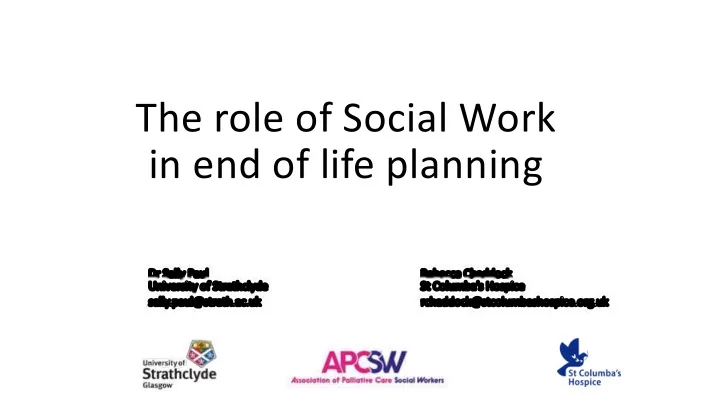

The role of Social Work in end of life planning
What is Social Work? Social work is a practice-based profession and an academic discipline that facilitates social change and development, social cohesion, and the empowerment and liberation of people. Principles of social justice, human rights, collective responsibility and respect for diversities are central to social work. Underpinned by theories of social work, social sciences, humanities and indigenous knowledge, social work engages people and structures to address life challenges and enhance wellbeing. (Global definition of Social Work, IFSW 2014)
The role of Social Work in End of Life Care Key messages: • Palliative, end of life and bereavement is core to all social work • Social work is vital to Palliative Care • All social workers have a role to play in ensuring equality and quality at end of life • Palliative Care Social Workers have a special role; they are based in every community and are an untapped resource. Association of Palliative Care Social Workers: www.apcsw.co.uk
Key Expertise …… • Person Centred • Systemic Practice • Strengths Based • Partnership working • Advocacy • Communication • Educated and embedded • Knowledge of relevant legislative/policy frameworks • Individual/family/group/community work
Case study • Eric is an 81year old man with a terminal cancer and metastatic disease. He lives with his 2nd wife Meg who is also in her 80’s. • Meg has Alzheimer’s and is not left on her own for long. She is unable to sequence and therefore cannot make meals or drinks, get dressed etc., without assistance. • Eric is no longer able to make meals or drinks. He is also unable to assist his wife with personal care or any aspects of daily living. • Eric and Meg moved into the area just before Meg was diagnosed so do not have a big network of friends to help. • Eric and Meg are power of attorney for each other. Who do they have: Eric’s son who lives abroad, friends an hour away, local hospice, care agency, health and social care professionals. What can the SW role offer here in eol planning and conversation?
Case study • John is a 40 year old man with a terminal Glioblastoma (brain tumour). He lives at home with his wife Jenny, 6 yr old son Jake and 6 month old daughter Polly. They have a dog, Oscar, and live in the country. • John is on sick leave from work. Jenny is on maternity leave. Jake attends school daily in the next village. • John is beginning to notice that things are getting worse. The surgery he’s had has left him with nerve pain in his head, and the radiotherapy he’s still having makes him very tired. What can the SW role offer here in eol planning and • They’ve had an OT at home who is helping them to adapt their home for John. John sees a conversation physio as an outpatient at the hospice every week to maintain his mobility. He and Jenny are beginning to struggle with his care needs, and Jake is frightened to be on his own. Who do they have: 2 sets of grandparents – both local, Friends, Jake’s school, John’s workplace, Jenny’s work place, young mums group, John’s football team mates, local church, local community, dog walking acquaintances, local hospice, health and social care professionals. What can the SW role offer here in eol planning and conversation ? • John, Jenny and Jake, prior to diagnosis
Palliative Care Social Work is often about helping people to regain control: we have a right to make decisions about our future care. By helping us to think about what is really important, ...and then helping us make plans for the future, we can still retain some control over our care, even if we lose capacity.
What would be important for you? You have two minutes to tell the person next to you what would be most important to you as you’re approaching end of life. Decide who’s going first – I’ll start the clock and give you one min. So everyone have a partner, and have you decided who’s going first?
Current Challenges • The missing social worker in End of Life Care ….. Murray S A, Kendall M, Boyd K, Sheikh A (2005) Illness trajectories and palliative care BMJ 330 :1007
Current Challenges • Under resourcing (services and social workers) • Demographic trends: an aging population • Changing patterns of illness • Over-professionlisation of death • Medical versus social models of health • Dialogue around life limiting illness • Individualism • Prizing youth
Qu Questions ……
Recommend
More recommend